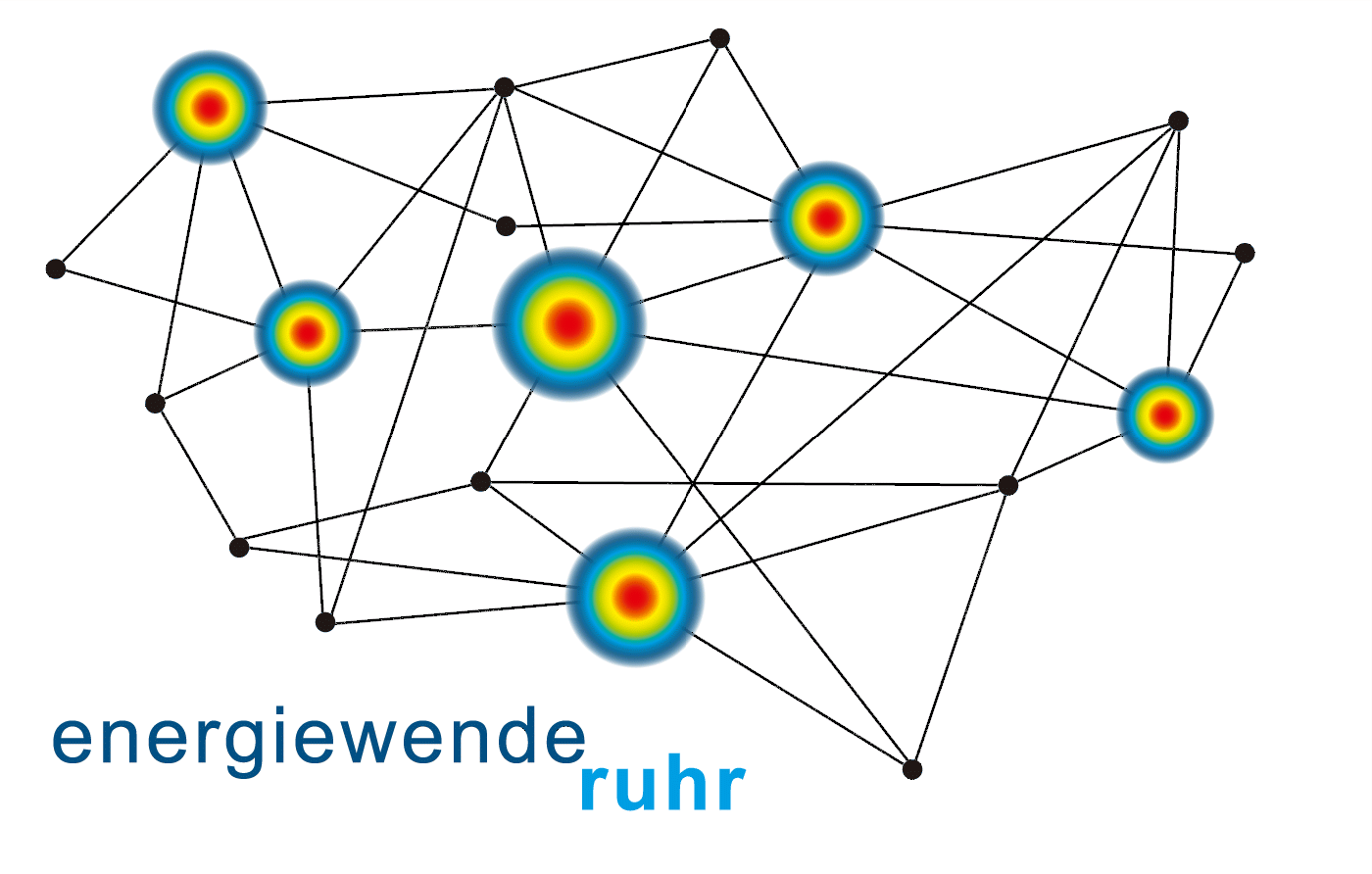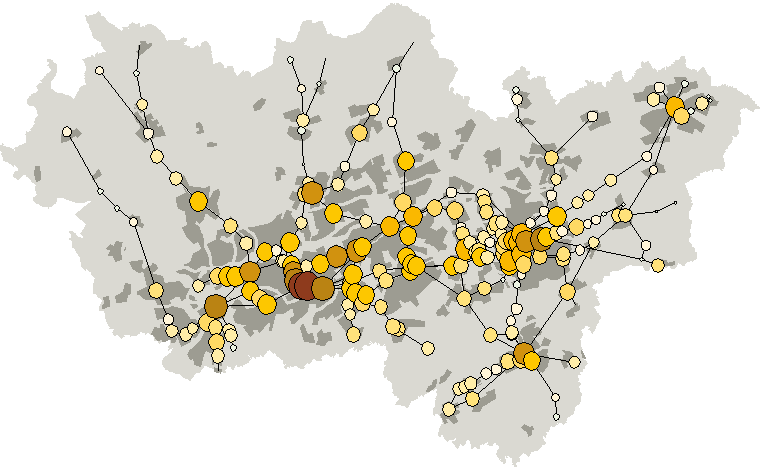Modelling the Energy Transition in the Ruhr Area (2013-2016)
 Cities are the largest consumers of energy and emitters of greenhouse gas emissions
through heating, production and transport. At the same time they are by their high density
particularly vulnerable to negative impacts of climate change, such as floods and
heat waves. With a population of more than five million, the Ruhr Area in Germany is one of the major
urban agglomerations in Europe. How can the ambitious greenhouse gas reduction targets
of the Federal and State government be achieved? Current policy approaches in the Ruhr Area
concentrate on incremental measures to reduce energy consumption and greenhouse gas
emissions but have yet failed to address comprehensive strategies towards climate protection.
This is disappointing as the Ruhr Area, through its industrial past and its polycentric
settlement structure, has a great potential for the reuse of former industrial brownfields
and the development of transport-reducing and energy-efficient settlement structures.
Cities are the largest consumers of energy and emitters of greenhouse gas emissions
through heating, production and transport. At the same time they are by their high density
particularly vulnerable to negative impacts of climate change, such as floods and
heat waves. With a population of more than five million, the Ruhr Area in Germany is one of the major
urban agglomerations in Europe. How can the ambitious greenhouse gas reduction targets
of the Federal and State government be achieved? Current policy approaches in the Ruhr Area
concentrate on incremental measures to reduce energy consumption and greenhouse gas
emissions but have yet failed to address comprehensive strategies towards climate protection.
This is disappointing as the Ruhr Area, through its industrial past and its polycentric
settlement structure, has a great potential for the reuse of former industrial brownfields
and the development of transport-reducing and energy-efficient settlement structures.
 The polycentric Ruhr Area
The polycentric Ruhr Area
One reason for the neglect of this potential in the past is the lack fo knowledge about the likely impacts of land use and transport policies and other policies to reduce energy consumption and greenhouse gas emissions on land use, mobility and the environment. This is why the Stiftung Mercator, a private foundation located in Essen, Germany, launched the Framework Programme for the Implementation of the Energy Transition in the Municipalities of the Ruhr Area to enhance knowledge and awareness of the need for and the challenges of the energy transition in the municipalities of the Ruhr Area. The four-year programme consisted of surveys, basic research projects, citizen participation and implementation studies.
The project Cities and Climate Change: Ruhr Area 2050 was part of this programme. In it the IRPUD model of urban land, transport and environment applied so far to the urban region of Dortmund was extended to cover the whole Ruhr Area and to assess the impacts of land use, transport and other policies to reduce energy consumption and promote the transition to renewable energy on economy, mobility, quality of life and environment in the Ruhr Area until 2050. For this the model was extended by submodels of energy efficiency of buildings, electromobility and carsharing and was used to simulate scenarios that differ in their assumptions about future energy price increases and possible combinations of measures to reduce fossil energy consumption and to increase energy efficiency and the use of renewable energy to achieve the energy policy targets of the State of North-Rhine Westphalia.
The project was a co-operation with the Institute of Urban Studies & Sustainable Infrastructure Planning, University of Wuppertal and the Wuppertal Institute for Climate, Environment and Energy.
For more information on the entire Framework Programme see its homepage at the Wuppertal Institute http://www.energiewende-ruhr.de
Reports
Reutter, O., Müller, M., Jansen, U., Schwarze, B., Spiekermann, K., Wegener, M., Huber, F., Brosch, K. (2017): Städte und Klimawandel: Maßnahmensteckbriefe. Wuppertal/Dortmund: Wuppertal Institute for Climate, Environment and Energy, Spiekermann & Wegener Urban and Regional Research, University of Wuppertal.
Schüle, R. and EnergyTransition team, including Schwarze, B., Spiekermann, K., Wegener, M. (2017): Die Energiewende regional gestalten. Auf dem Weg zu einer Energiewende Roadmap im Ruhrgebiet. Wuppertal: Wuppertal Institute for Climate, Environment and Energy.
Schwarze, B., Spiekermann, K., Wegener, M., Huber, F., Brosch, K., Reutter, O., Müller, M. (2017): Cities and Climate Change: Ruhr Area 2050. Integrated Ruhr Area Model and Regional Modal Shift. Final Report. Dortmund/Wuppertal: Spiekermann & Wegener Urban and Regional Research, University of Wuppertal, Wuppertal Institute for Climate, Environment and Energy.
Brosch, K., Huber, F., Schwarze, B., Spiekermann, K., Wegener, M. (2014): Integriertes Modell Ruhrgebiet 2050: Stand der Forschung November 2014. Dortmund/Wuppertal: S&W/LUIS.
Brosch, K., Huber, F., Schwarze, B., Spiekermann, K., Wegener, M. (2014): Integriertes Modell Ruhrgebiet 2050: Projektbeschreibung Oktober 2014. Dortmund/Wuppertal: S&W/LUIS.
Progress in model development
October 2015
April 2015
January 2015
September 2014
June 2014
April 2014
Journal papers
Reutter, O., Müller, M., Schwarze, B., Spiekermann, K., Wegener, M., Huber, F., Brosch, K. (2018): Verkehr verlagern! Szenarioanalysen zu Modal-Shift-Potenzialen im Personenverkehr im Ruhrgebiet 2050. Straßenverkehrstechnik 01/2018, 7-18.
Conferences
Wegener, M., Schwarze, B., Spiekermann, K., Brosch, K., Huber, F., Müller, M., Reutter, O. (2018): Modelling the great transformation in the Ruhr Area. Presentation at the conference Urban Mobility – Shaping the Future Together mobil.TUM 2018, Munich, 13-14 June 2018.
Brosch, K., Huber, F., Schwarze, B., Spiekermann, K., Wegener, M. (2016): Integrierte Stadtmodellierung: Flächennutzung, Verkehr, Energie, Umwelt. Paper presented at the Dortmund Conference on Spatial Planning and Research 2016: Spatial Patterns – Structure, Dynamic, Planning , TU Dortmund, 22-23 February 2016.
Preliminary results of the project at the Intermediate Conference of the programme at the LWR Industrial Museum in Oberhausen on 17 June 2015.
Schwarze, B., Spiekermann, K., Wegener, M. (2015): Are polycentric cities morte energy-effiient?. Paper presented at the Iinternational Conference Polycentric City Regions in Transformation – The Agglomeration Ruhr in International Perspective, Zeche Zollverein, Essen, 11-13 June 2015.
Huber, F., Schwarze, B., Spiekermann, K., Wegener, M. (2013): Modelling the energy transition in cities. Paper presented at the 13th International Conference on Computers in Urban Planning and Urban Management, Utrecht, 2-4 July 2013.
Fuerst, F., Wegener, M. (2013): Energy efficiency of buildings: a new challenge for urban models. Paper presented at the Applied Urban Modelling Symposium (AUM 2012), University of Cambridge, 24-26 June 2012.
Huber, F. Brosch, K. (2011): Nachhaltige Verkehrsinfrastruktur Ruhr 2050. Presentation at the Urban Design Colloquium of the Faculty of Spatial Planning, TU Dortmund University, 8 November 2011.
Wegener, M. (2011): Nachhaltige Mobilität durch Polyzentralität. Presentation at the Urban Design Colloquium of the Faculty of Spatial Planning, TU Dortmund University, 8 November 2011.
